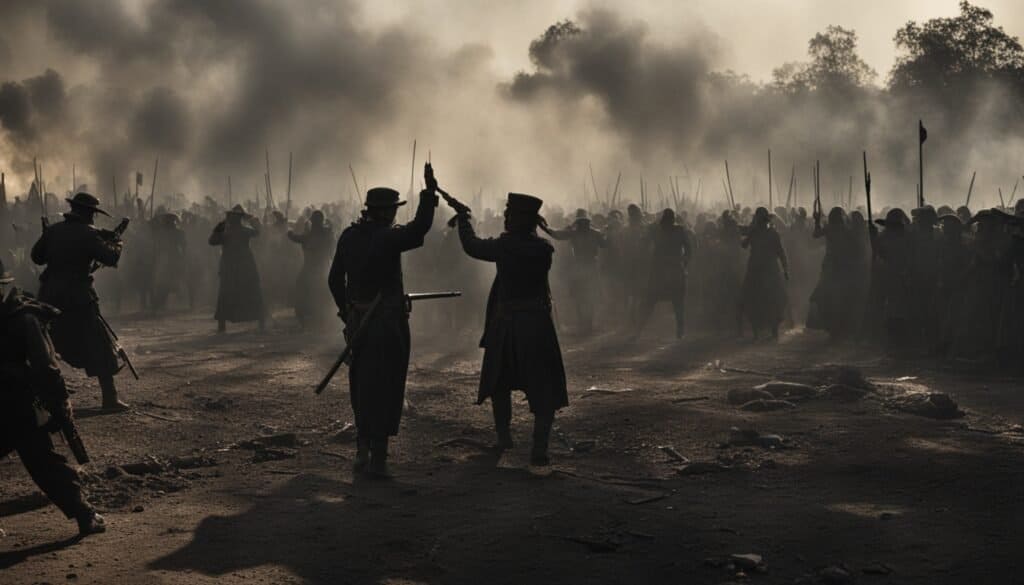Ever thought about what happens when people challenge authority? In the Bible, the Rebellion of Korah is a key event. It shows the risks of defying God’s leaders and teaches us about leadership, unity, and following rules. This story, in the book of Numbers, makes us think about respecting God’s authority and the risks of being proud.
Let’s explore this story together to find the deep lessons it teaches us.
Key Takeaways
- The Rebellion of Korah reveals the dangers of challenging appointed leadership.
- Unity within the congregation is essential for maintaining peace and harmony.
- Obedience to God’s will is a recurring theme in biblical narratives.
- Korah’s motivations unlock deeper truths about human nature and authority.
- The consequences of rebellion serve as a powerful warning for future generations.
Introduction to Korah’s Rebellion
Korah’s rebellion shows a deep conflict in the Israelite community. Korah, a Levite, challenges Moses and Aaron’s leadership. This event is crucial as it shows why they wanted to take power.
The rebellion comes from pride and a desire for power. Korah’s actions teach us about the dangers of ambition and disrespecting leaders. It shows the value of staying humble and respecting those in charge.
This story reveals the tensions within the Israelite community. It warns us about the dangers of division and disrespect. It encourages us to work together and respect each other in our communities.
Narrative Background: Numbers 16:1-3: Korah, Dathan, Abiram, and On Rebel Against Moses and Aaron’s Leadership
In Numbers 16:1-3, we see a key moment of rebellion against leadership. Korah, Dathan, Abiram, and On challenge Moses and Aaron’s authority. Their actions show deep unrest in the Israelite community during their desert journey.
Character Profiles of the Rebels
Korah is a Levite, which means he’s part of Israel’s religious group. Dathan and Abiram come from the tribe of Reuben and want more power. On joins them, showing they all want to change the leadership.
Their reasons for rebelling are complex. They want more influence and recognition. This desire leads them to challenge Moses and Aaron.
The Context of Their Challenge
The situation was tough for the Israelites during their exodus. Hardships made many unhappy with their leaders. They felt stuck, not moving towards the Promised Land fast enough.
This set the stage for Korah, Dathan, Abiram, and On to challenge Moses and Aaron. They saw a chance to take power.

The Challenge to Moses’ Authority
The uprising against Moses was more than just opposition. It brought up deep questions about divine leadership. This challenge to Moses’ authority shows a big issue about respecting and following God’s chosen leaders. The rebels wanted equal status, causing a big problem in the Israelite community.
Korah and his followers wanted more power and recognition. They doubted Moses, who was chosen by God to lead the people. Their actions made us think about the balance between God’s authority and human desires. They wanted a say, which made them question God’s leadership.
In our communities, we can think about what this rebellion means. It makes us wonder about what true leadership is and how it affects our faith. To learn more, we can look into the deep issues of divine authority by checking this insightful resource.
Numbers 16:8-10: Korah and His Followers Challenge Moses
In Numbers 16:8-10, Korah and his followers directly challenge Moses. They accuse him of putting himself above the community. This sparks big leadership challenges. It shows how deep tensions can grow between those in power and those who want to change things.
Moses then defends himself against these serious accusations. This shows how community relationships change when faced with such challenges.
Accusations Against Moses’ Leadership
Korah’s group says Moses favors Aaron too much. They believe everyone is holy and Moses shouldn’t have a special status. These claims cause unrest among the people. It makes us think about how leadership issues can break up a community.
Understanding Korah’s Motivations
Looking into Korah’s motivations helps us understand his rebellion. Levites felt left out by Aaron’s priestly role. Their unhappiness came from personal issues and bigger community problems. This shows us how leaders and followers interact during hard times.

Moses’ Response and God’s Test
Leaders often face tough times when people rebel. Numbers 16:15 shows a key moment when Moses asks God for help. He is deeply worried about the trouble caused by Korah and his group. This shows how important prayer is for leaders in hard times.
Moses’ Prayer: Numbers 16:15
Moses shows his deep worry and humility in this moment. He doesn’t just react; he actively seeks God’s help to lead his people. His prayer in Numbers 16:15 shows his trust in God’s wisdom, which is an example for leaders today.
Seeking Divine Intervention
Moses knows he needs guidance when facing rebellion. He looks to God for help, showing us the value of prayer in leadership. Throughout history, leaders who prayed found their way through tough times with more clarity and purpose.

| Key Themes | Description |
|---|---|
| Moses’ Humility | A leader recognizing their limitations and seeking God’s help. |
| Importance of Prayer | Prayer as a foundational element of effective leadership. |
| Divine Intervention | God’s guidance provides clarity in chaotic situations. |
| Responses to Rebellion | Understanding how leadership can influence group dynamics. |
Moses is a great example for today’s leaders facing challenges. He shows us the power of faith and seeking wisdom. His story encourages us to use prayer in our leadership roles.
The Divine Judgment
In Numbers 16:32-33, Korah and Abiram faced a dramatic end. The earth swallowed them up. This shows the significance of divine judgment for those who rebel. Their death highlights the consequences of rebellion against God’s authority.
Numbers 16:32-33: The Earth Swallows Up Korah and Abiram
Numbers 16:32-33 tell us how the earth opened to swallow the rebels. This shows the severe biblical consequences of questioning God’s leaders. The swift and clear judgment shows the big impact of rebellion in faith communities.
Significance of This Dramatic Event
This event is more than just punishment. It shows God’s total control over His people. The dramatic judgment shows the significance of divine judgment in guiding the Israelites. We learn about faithfulness, obedience, and the dangers of defiance from this story.
Such stories teach us to respect God’s spiritual order. As the consequences can be severe, we must follow God’s plan.

The Role of the Fire Pans
The story in Numbers 16:37-39 shows how the fire pans changed after God’s judgment. These pans were made into plates for the altar, showing a big change for the community. This act reminds us of rebellion but also of the chance for repentance and new beginnings in worship.
Numbers 16:37-39: Hammering the Fire Pans into Plates for the Altar
Numbers 16:37-39 tells us how the fire pans, once tools of rebellion, got a new purpose. This event shows God’s wish for the Israelites to recall their past mistakes and seek forgiveness. It highlights God’s wish for unity among His people.
Symbolism of the Fire Pans
The fire pans symbolize more than just tools; they remind us of the dangers of disobeying God. This act stresses the importance of being accountable in our worship and recognizing God’s power in our communities. By changing the fire pans, the leaders showed how even rebellion’s leftovers can be used for sacred worship, showing our dedication to God. These symbols can deeply affect our worship and community life, connecting us more to our faith and history. For more insights, we can look into the themes of dysfunction in the Bible.
How Does the Righteous Reign of Josiah Contrast with the Rebellion of Korah?
Josiah’s transformative kingship in scripture stands in stark contrast to the rebellion of Korah. While Josiah brought about significant reforms, aligning the nation with God’s commandments, Korah’s insurrection represented defiance and chaos. This juxtaposition highlights the impact of righteous leadership versus the dangers of dissent and disobedience in the realm of faith.
The Aftermath: A Warning to the Congregation
After Korah’s rebellion, the story takes a new turn. God’s command about Aaron’s rod is key. It shows how important it is to follow God’s choice in leadership. By saving Aaron’s rod, God made it clear that Aaron was the right leader.
The Command to Keep Aaron’s Rod: Numbers 17:10
This order stops others from taking power. It teaches us today about respecting God’s way of leading. It tells us what happens when we challenge God’s plan, like Korah did. Keeping Aaron’s rod reminded everyone of God’s choice and Aaron’s rightful place.
Emphasizing the Legitimacy of Aaron’s Priesthood
This command teaches us about order and respect in faith communities. It shows God’s power and the leadership structure He set up. It reminds us to stick with God’s plan, helping us think about how we honor leaders in our lives.
Affiliate Disclosure: "As an Amazon Associate I earn from qualifying purchases made from links in this post. We are a participant in the Amazon Services LLC Associates Program, an affiliate advertising program designed to provide a means for us to earn fees by linking to Amazon.com."

